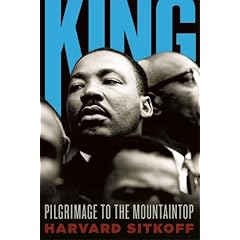MLK Was Both a Talker and a Doer, Hillary
 According to Hillary Clinton’s version of history, Martin Luther King,
Jr. was a dreamer, a talker (much as she labels Barack Obama), and the
person really responsible for civil rights progress in the 1960s was
President Lyndon Johnson, a doer (as she sees herself). This comment on
history highlighted herself as the experienced candidate of accomplishment,
and it may well have helped her to succeed in scoring an upset victory
against Obama in the New Hampshire primary. Nevertheless, she fails U.S.
History 101.
According to Hillary Clinton’s version of history, Martin Luther King,
Jr. was a dreamer, a talker (much as she labels Barack Obama), and the
person really responsible for civil rights progress in the 1960s was
President Lyndon Johnson, a doer (as she sees herself). This comment on
history highlighted herself as the experienced candidate of accomplishment,
and it may well have helped her to succeed in scoring an upset victory
against Obama in the New Hampshire primary. Nevertheless, she fails U.S.
History 101.MLK was never a mere dreamer, never only a talker. He stood up for what is right, repeatedly putting his body on the line, going to jail again and again, constantly facing death threats. By such actions, King and a multiplicity of black leaders and movements at the grass-roots level mobilized black Americans as they had never previously been mobilized to collectively bring about change. King, above all, stirred African Americans’ emotions, raised their hopes, convinced them to believe in their abilities to alter history, and got them to come together to press for racial justice in a manner that could not be, and was not, denied.
Organizing mass demonstrations, encouraging an unprecedented burst of African American activism, and employing non-violent direct action tactics, King and those who struggled alongside him in 1963 in Birmingham and elsewhere provoked a national outcry that forced the Kennedy administration to propose a comprehensive civil rights bill. Intensifying the pressure on the Johnson administration to make the bill “must” legislation, King and his followers launched another protest campaign in St. Augustine in 1964. The strategy worked, and the historic Civil Rights Act of 1964 ended legally sanctioned racial discrimination and segregation in most public accommodations and facilities, outlawed racial bias in federally funded programs practicing discrimination, banned discrimination by employers and unions, created the Equal Employment Opportunity Commission to enforce the ban on job discrimination, and granted the federal government new powers to fight school segregation.
It took a whole lot of ordinary black Americans, as well as King and Johnson, to achieve that legislation. The Civil Rights Act, King rightly said, “was first written in the streets.” It reflected the impact of a national conscience that had been educated and inspired by the civil rights movement and its leaders. That was similarly true of the equally historic Voting Rights Act of 1965. It was never a simple matter of talk or action, a dreamer versus a doer. No one should deny Lyndon Johnson’s skillful use of presidential, and personal, powers to break a southern filibuster in the Senate and to get the civil rights bills through Congress in a timely and unscathed manner. Nor should Americans forget what this young African American Baptist preacher did to inspire ordinary blacks to do the extraordinary, to struggle collectively for equality and first-class citizenship. Vitally worth remembering as well is all King did to attract the great middle body of white public opinion to make civil rights---in the words of the Republican leader of the Senate, Everett Dirksen, quoting Victor Hugo---“an idea whose time had come.”
Perhaps Hillary Clinton has got her history of the 1964 Civil Rights Act wrong because she had been so enthralled that year by Barry Goldwater. An “active Young Republican” and “a Goldwater girl right down to my cowgirl outfit,” as described in her memoir, Clinton supported the presidential candidacy of the most vociferous Republican opponent of the civil rights bill in the Senate, the right-winger who made criticism of civil rights the centerpiece of his bid for the White House. And even in 1969, after switching party allegiances Clinton chose to use the occasion of her Wellesley University commencement address to talk mainly about course requirements and grading, not about King or civil rights.
Its time for all Americans to recognize that King, hardly a mere dreamer, moved the conscience of a generation. In the face of great odds he altered American habits of thought and action more than any other figure of his century, and made the United States far more just, democratic, and egalitarian. He and the Movement are truly worth celebrating.
